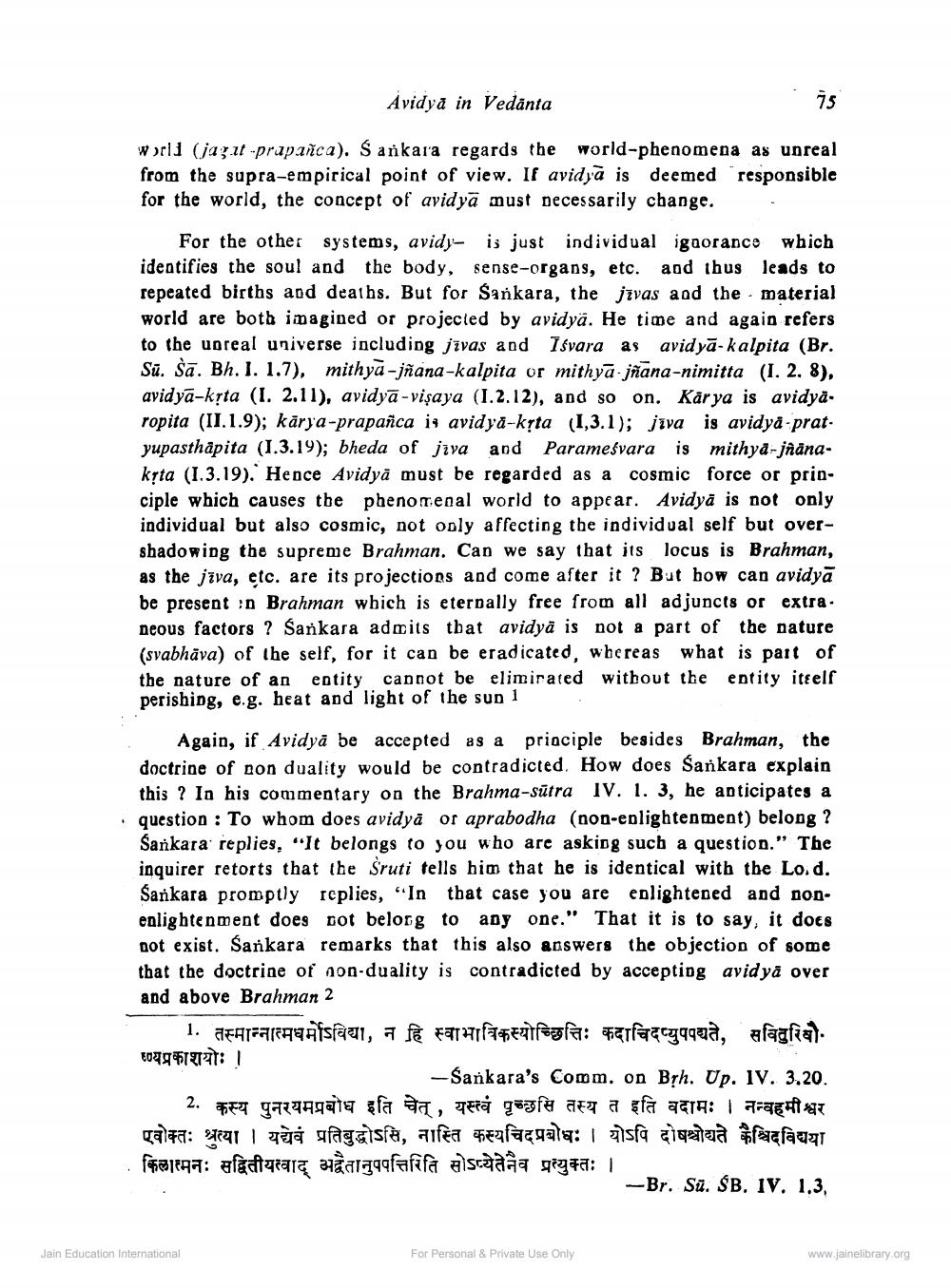________________
Avidyā in Vedanta
75
world (jazat-prapañca). Sankara regards the world-phenomena as unreal from the supra-empirical point of view. If avidyā is deemed responsible for the world, the concept of avidyā must necessarily change.
For the other systems, avidy- is just individual igaorance which ideatifies the soul and the body, sense-organs, etc. and thus leads to repeated births aod deaths. But for Sankara, the jivas and the material world are both imagined or projecied by avidya. He time and again refers to the unreal universe including jīvas and Isvara as avidyā- kalpita (Br. Sū. Šā. Bh. I. 1.7), mithya -jñana-kalpita or mithyā jñāna-nimitta (1. 2. 8). avidyā-krta (I. 2.11), avidyā - vişaya (1.2.12), and so on. Karya is avidyaropita (II.1.9); kārya-prapanca is avidya-ksta (1.3.1); jīva is avidya-prat. yupasthäpita (1.3.19); bheda of jiva and Parameśvara is mithya-jñānakyta (1.3.19). Hence Avidyā must be regarded as a cosmic force or principle which causes the phenomenal world to appear. Avidya is not only individual but also cosmic, not only affecting the individual self but overshadowing the supreme Brahman. Can we say that its locus is Brahman, as the jiva, etc. are its projections and come after it ? But how can avidyā be present in Brahman which is eterpally free from all adjuncts or extra. neous factors ? Sankara admits tbat avidyā is not a part of the nature (svabhāva) of the self, for it can be eradicated, whereas what is part of the nature of an entity cannot be elimirated without the entity itself perishing, e.g. heat and light of the sun 1
Again, if Avidyā be accepted as a principle besides Brahman, the doctrine of non duality would be contradicted. How does Sankara explain this ? In his commentary on the Brahma-sūtra IV. 1. 3, he anticipates a question : To whom does avidyā or aprabodha (non-eplightenment) belong? Sankara replies, “It belongs to you who are asking such a question." The inquirer retorts that the Sruti tells him that he is identical with the Lo.d. Sankara promptly replies, "In that case you are enlightened and nonenlightenment does not belong to any one." That it is to say, it does not exist. Sankara remarks that this also answers the objection of some that the doctrine of non-duality is contradicted by accepting avidyā over and above Brahman 2
1. तस्मान्नात्मधर्मोऽविद्या, न हि स्वाभाविकस्योच्छित्तिः कदाचिदप्युपपद्यते, सवितुरिवी. एण्यप्रकाशयोः ।
-Sankara's Comm. on Brh. Up. IV. 3.20. 2. कस्य पुनरयमप्रबोध इति चेत् , यस्त्वं पृच्छसि तस्य त इति वदामः । नन्वहमीश्वर एवोक्तः श्रुत्या । यद्येवं प्रतिबुद्धोऽसि, नास्ति कस्यचिदप्रबोधः । योऽपि दोषश्चोद्यते कैश्चिदविद्यया . किलात्मनः सद्वितीयत्वाद् अद्वैतानुपपत्तिरिति सोऽप्येतेनैव प्रत्युक्तः ।
--Br. Sü. ŚB. IV. 1.3,
Jain Education International
For Personal & Private Use Only
www.jainelibrary.org




